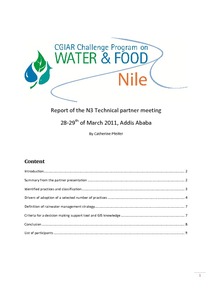Location
Vision, mission and strategy
ILRI's strategy 2013-2022 was approved in December 2012. It emerged from a wide processof consultation and engagement.
ILRI envisions... a world where all people have access to enough food and livelihood options to fulfil their potential.
ILRI’s mission is... to improve food and nutritional security and to reduce poverty in developing countries through research for efficient, safe and sustainable use of livestock—ensuring better lives through livestock.
ILRI’s three strategic objectives are:
- with partners, to develop, test, adapt and promote science-based practices that—being sustainable and scalable—achieve better lives through livestock.
- with partners,to provide compelling scientific evidence in ways that persuade decision-makers—from farms to boardrooms and parliaments—that smarter policies and bigger livestock investments can deliver significant socio-economic, health and environmental dividends to both poor nations and households.
- with partners,to increase capacity among ILRI’s key stakeholders to make better use of livestock science and investments for better lives through livestock.
This is ILRI’s second ten-year strategy. It incorporates a number of changes, many based on learning from the previous strategy (2000–2010, initially produced in 2000 and modified in 2002), an interim strategy (2011–2012) and an assessment of the external and internal environments in which the institute operates.
Members:
Resources
Displaying 641 - 645 of 1152A national platform/network for land and water management in the Nile Basin: Why do we need one?
The impacts of the Arid Lands Resource Management Project (ALRMPII) on livelihoods and vulnerability in the arid and semi-arid lands of Kenya
There is an urgent need for new approaches and effective models for managing risk and promoting sustainable development in arid and semi-arid lands (ASALs), especially in the face of climate change and increasing frequency of drought in many areas. This study assesses the impacts of the Arid Lands Resource Management Project (ALRMPII), a community-based drought management initiative implemented in 28 arid and semi-arid districts in Kenya from 2003 to 2010.
Report of the NBDC N3 Technical Partner Meeting, Addis Ababa, 28-29 March 2011
Research approach in the Volta Basin Development Challenge not 'business as usual'
In this interview, Augustine Ayantunde from ILRI introduced an ILRI-led project on 'integrated management of rainwater in mixed crop-livestock integrated systems' (in the Volta river basin). The project aims to evaluate and test best fit rainwater management strategies in Ghana and Burkina Faso. According to Ayantunde, the approach of the project is not 'business as usual.' Instead of traditional linear research for farmers, the emphasis project is on the participation of local stakeholders and communities through innovation platforms.
Pastoralist futures in Africa a balance between traditions and opportunities
ILRI's Augustine Ayantunde reflects on the recent conference in Addis Ababa on the future of pastoralism in Africa. He draws attention to the two major conference strands - on one side, the optimists, on the other 'doom and gloom.' One thing is clear, it is not really possible to generalise across regions. He concludes by suggesting that the future will lie in pastoralist communities being able to take advantage of present opportunities while also taking care of their traditions.





